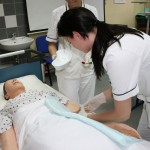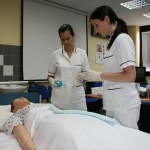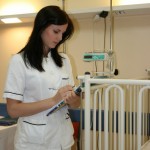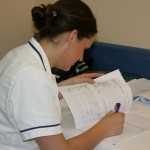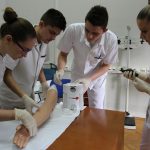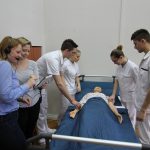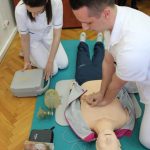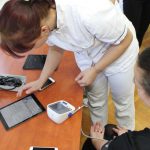Study curriculum | Accreditation [PDF]
Rationale Modern development of science and allied disciplines, high technology, great population growth in cities and general migration of population have produced great impact on modern man’s way of living. The burden posed to individuals, families and entire communities reflects itself on health and health status, and also on the organisation of health case system as a whole. At the turn of the third millennium the prevailing diseases include chronic non-infective diseases, malignancies, trauma, and an increasing number of new infectious diseases. High technological standards have been introduced into the processes of treatment and nursing care. It has become obvious that technologization, and even medicalisation in this case, results in dehumanisation as a deeply imbedded determinant in health care systems of highly developed countries. As a counter-action, in the past few decades a movement initiated by World Health Organisation has been implemented that is focused on health and its improvement. The pinpoints of the “Health for All by 2010″ project comprise improvement and maintaining of health through knowledge, free decision-making and responsibility, together with the ensuring of quality of life in both health and disease (WHO – European Health 21 – WHO Regional Committee for Europe, Copenhagen 1998). One of the WHO most important recommendations is the realisation of the Objective 18 – Development of Human Resources in Health. Namely, by the year 2010 al EU member countries should ensure that all health professionals in the health care system and in other allied fields, possess satisfactory knowledge, attitudes and competences that can contribute to health maintenance and improvement. As special emphasis is put on high quality education of all profiles of health workers, the Munich Declaration/WHO 2000 sets the determinants of future education of nurses as well. Having in mind the principles of the Munich Declaration, saying that all educational programs need to be harmonised with the needs of the profession and submitted to quality control and evaluation, it is clear that in Croatia “significant interventions” in the system of nursing education need to be undertaken. The upcoming reform of health care system includes the following: categorisation of hospitals, categorisation of units, health standards, different types of health insurance, and other. All of these will pose the need for significantly different professional profiles of nurses. According to WHO and EU recommendations and standards, adequately professionally trained and educated nurses are needed. Consequently, Croatian health care system needs nurses who possess not only elementary knowledge and skills of nursing care, but also those educated at a higher level who can respond to demands of the fields as complex as management, leadership, public health and “self-reproduction.” Between these two points, i.e. auxiliary vs. graduate, there are many other opportunities for education and professional training, particularly when speaking of complex and sophisticated specialisations concerning various forms of nursing care. Education programs together with the development of nursing as a profession, need to be harmonised with world standards.
General information
Teaching Institution University of Applied Health Sciences
Name of the Study Professional Study Program in Nursing
Duration Three (3) academic years (6 semesters)
Admission Conditions Fully completed four-year secondary school program and entrance exam.
Job skills and competences
The International Council of Nurses defines the competences of a nurse and states that she is authorised to do the following:
- perform all tasks of general nursing practice including improvement of health, prevention of disease and direct care of the sick or the disabled, regardless of their age, in health institutions and in the community;
- participate in health education activities;
- act as a fully equal member of health team;
- carry out training and supervision of nurses and assistant nursing staff;
- be included in research activities.
Upon completion of curricular requirements the graduate students will be able to perform nursing practice as follows:
- They will have adequate knowledge of biological and humanistic sciences, of human growth and development, the concept of health and its promotion, the knowledge of pathophysiology underlying different health problems, knowledge about the principles of learning and teaching, communication skills and other relevant knowledge needed to perform the nursing practice.
- They will know how to warn about ethical dimensions of health care in terms of staff inadequacy, lack of appropriate health policy, violation of patient’s rights, inadequate equipment, drugs, etc, all of which include correct relations with patients.
- They will be trained to perform the following nursing skills: application of the process of nursing care, communication with clients and team members, keeping nursing records, ensuring clients’ safety and comfort, application of the teaching and learning skills, organisation of nursing care for different types of patients, application of decision-making principles, critical opinion making and problem solving, application of “social justice” principle, participation in diagnostic and therapeutic procedures; comprehensive analysis of the patient’ situation (family, psychological, spiritual, social) with regard to nursing care of the patient.
- They will learn how to professionally behave in terms of the following: doing all the tasks and applying the authorised interventions, recognition of one’s own need for continuing education, ability to function as a responsible member of health team, professional conduct with other staff members, protection of the interests of the profession, recognition and need for professional association, practicing and improving of nursing care standards.
Upon completion of study curricula a health professional is trained in the following skills of nursing practice:
- act by the principles of unique nursing care respecting the client’s personality and applying holistic approach and partnership base relation;
- apply the nursing process, i.e. make assessment of health needs, set goals and define priorities, plan and implement adequate procedures, evaluate and, if necessary, modify the nursing plan;
- keep nursing records and evaluate results;
- organise nursing care for different types of users in different health and social institutions and at the clients’ homes, and supervise its implementation;
- follow up human growth and development through all life cycles and undertake activities that contribute to the promotion of growth and development;
- competently use knowledge and skills that contribute to health promotion, and undertake activities that support maintaining of good and protection from disease of an individual, a family, and the community;
- use appropriate communication skills with the clients, families, team members, and others;
- take care about keeping the client’s environment healthy and safe, and prevent all risks;
- have knowledge and skills about how to monitor health status of patients and individuals at life risk and intervene as authorised;
- participate in the planning and implementation of diagnostic and therapeutic procedures prescribed, carried out and supervised by a physician;
- participate and act in health team at all levels of health care and collaborate in a multidisciplinary team;
- manage the health care team, organise and manage nursing service at all levels of health care;
- develop professional relation and responsibility and act in accordance with legal, moral and ethical norms;
- work on improvement of nursing practice standards;
- recognise one’s own needs and opportunities for continuing education, follow other allied sciences and apply their knowledge in one’s profession; follow studies in nursing profession and participate in them;
- participate in training of nurses and other health professionals, but, when necessary, professionals of other branches as well.
Professional competence in the field of nursing care comprises the following group activities:
- Assessment by collecting, analysis, interpretation and presentation of data
- Planning of health care
- Implementation of health and nursing care
3.1. Carrying out of basic and special care
3.2. Carrying out of nursing care interventions / algorithms
3.3. Care about environment
- Evaluation, reporting and recording of provided nursing care
- Promotion of health and health education
- Coordination of nursing care at micro and macro levels
- Organisation, management and definition of policy at micro and macro levels;
- Quantity and quality of nursing care supervision and management;
- Promotion of professional competence at macro level.
(WHO DECLARATION, Munich, 2000)
Other information



